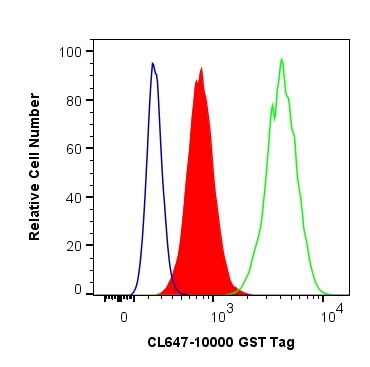GST Tag Polyklonaler Antikörper
GST Tag Polyklonal Antikörper für FC (Intra)
Wirt / Isotyp
Kaninchen / IgG
Getestete Reaktivität
rekombinanten Protein
Anwendung
FC (Intra)
Konjugation
CoraLite® Plus 647 Fluorescent Dye
Kat-Nr. : CL647-10000
Synonyme
Geprüfte Anwendungen
| Erfolgreiche Detektion in FC (Intra) | Jurkat-Zellen |
Empfohlene Verdünnung
| Anwendung | Verdünnung |
|---|---|
| Durchflusszytometrie (FC) (INTRA) | FC (INTRA) : 0.40 ug per 10^6 cells in a 100 µl suspension |
| It is recommended that this reagent should be titrated in each testing system to obtain optimal results. | |
| Sample-dependent, check data in validation data gallery | |
Produktinformation
CL647-10000 bindet in FC (Intra) GST Tag und zeigt Reaktivität mit rekombinanten Protein
| Getestete Reaktivität | rekombinanten Protein |
| Wirt / Isotyp | Kaninchen / IgG |
| Klonalität | Polyklonal |
| Typ | Antikörper |
| Immunogen | Rekombinantes Protein |
| Vollständiger Name | GST Tag |
| Berechnetes Molekulargewicht | 26 kDa |
| GenBank-Zugangsnummer | FN315687 |
| Gene symbol | |
| Gene ID (NCBI) | |
| Konjugation | CoraLite® Plus 647 Fluorescent Dye |
| Excitation/Emission maxima wavelengths | 654 nm / 674 nm |
| Form | Liquid |
| Reinigungsmethode | Antigen-affinitätsgereinigt |
| Lagerungspuffer | PBS with 50% glycerol, 0.05% Proclin300, 0.5% BSA |
| Lagerungsbedingungen | Bei -20°C lagern. Vor Licht schützen. Nach dem Versand ein Jahr stabil. Aliquotieren ist bei -20oC Lagerung nicht notwendig. 20ul Größen enthalten 0,1% BSA. |
Hintergrundinformationen
GST(Glutathione S-Transferase) is a widely used protein tag encoded by the Schistosoma japonicum. GST provides both an easily detectable tag and a simple purification process with little effect on the biological function of the protein of interest. This GST-fusion protein can then be purified from cells via its high affinity for glutathione. Antibodies to GST are useful for checking protein expression both in plaques and on western blots as well as for immunoaffinity purification of proteins expressed in cells. This antibody can be used to detect the GST tagged protein. This antibody can be used as Rabbit IgG control in FC.
Protokolle
| PRODUKTSPEZIFISCHE PROTOKOLLE | |
|---|---|
| FC protocol for CL Plus 647 GST Tag antibody CL647-10000 | Download protocol |
| STANDARD-PROTOKOLLE | |
|---|---|
| Klicken Sie hier, um unsere Standardprotokolle anzuzeigen |


